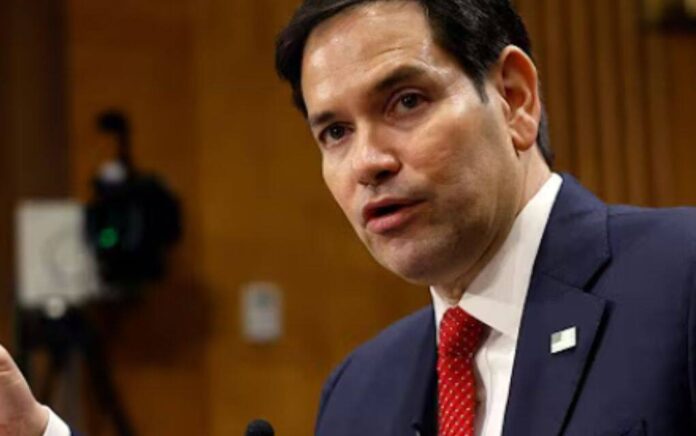
Democrats in Congress have declared war on the Trump admin. They’re going for the jugular.
But the U.S. Secretary of State just made Congress go silent with this genius comeback for a Democrat Senator.
Rubio’s Razor-Sharp Rebuttal to Democrat’s MS-13 Defense Ignites Firestorm
Secretary of State Marco Rubio delivered a stinging rebuke to Maryland Senator Chris Van Hollen, who accused the Trump administration of sidestepping due process in the deportation of alleged MS-13 gang member Kilmar Abrego Garcia. The confrontation, crackling with tension, unfolded as Van Hollen expressed regret for supporting Rubio’s nomination, citing concerns over Garcia’s removal. Rubio, undeterred, turned the tables, framing the deportation as a necessary move to protect American communities from dangerous criminals.
“I have to tell you directly in person that I regret voting for you for Secretary of State,” Van Hollen said, his tone heavy with reproach. The senator’s criticism stemmed from the administration’s decision to deport Garcia, an El Salvadoran who illegally entered the U.S. in 2011 and is accused of ties to the notorious MS-13 gang. Van Hollen argued the move lacked proper legal procedure, a charge Rubio dismissed with characteristic vigor.
“May I respond? Well first of all, your regret for voting for me means that I’m doing a good job,” Rubio fired back, his words laced with defiance. He didn’t stop there, taking a pointed jab at Van Hollen’s curious affinity for Garcia. “We deported gang members… including the one that you had a margarita with,” Rubio said, referencing a controversial meeting between the senator and Garcia in El Salvador. “And that guy is a human trafficker and that guy is a gangbanger and the evidence is gonna be clear. In the day to come, you’re gonna see who you went to defend.”
Garcia’s rap sheet is as troubling as Rubio suggested. In March 2019, authorities found him loitering in a Home Depot parking lot, sporting a Chicago Bulls hat and a hoodie emblazoned with rolls of cash covering the faces of U.S. presidents—a known symbol of “good standing” with MS-13, according to Department of Justice documents released on April 16. By December 2019, the Board of Immigration Appeals had upheld an immigration judge’s ruling that Garcia was a “verified member of MS-13,” cementing his status as a threat.
The evidence against Garcia doesn’t end there. In 2022, Tennessee highway authorities grew suspicious when they stopped him driving a car with eight passengers and no luggage. The vehicle belonged to Jose Ramon Hernandez-Reyes, an illegal immigrant convicted of human smuggling in 2020. This incident added fuel to allegations that Garcia was involved in human trafficking, further justifying the administration’s hardline stance.
Domestic violence allegations also shadow Garcia. Court documents from the Department of Homeland Security reveal that in 2021, his wife, Jennifer Vasquez Sura, sought a restraining order, accusing him of brutal physical abuse. She claimed Garcia scratched and punched her eye, tore her clothing, and smashed her laptop, leaving her bloodied. These accusations paint a grim portrait of a man whose presence in the U.S. posed a clear danger.
Yet, despite this dam*ing record, Van Hollen traveled to El Salvador to meet Garcia, a trip funded by U.S. taxpayers, as the senator confirmed on April 21. Photos surfaced of Van Hollen sitting across from the alleged gang member in a restaurant, a move that raised eyebrows and drew sharp criticism from those who see it as coddling a criminal. Rubio’s quip about Van Hollen’s “margarita” moment landed as both a rhetorical jab and a reminder of the senator’s questionable priorities.
Van Hollen wasn’t alone in his pilgrimage. Democrat Representatives Maxwell Frost of Florida, Robert Garcia of California, Yassamin Ansari of Arizona, and Maxine Dexter of Oregon also made the trek to El Salvador, ostensibly to protest the Trump administration’s immigration policies. Their visit was seen by many as a direct challenge to President Trump’s efforts to crack down on illegal immigration and gang activity, a cornerstone of his agenda.
The administration, while acknowledging Garcia’s deportation as a “clerical error,” has stood firm on keeping him in El Salvador, citing his criminal history. This position has sparked legal battles, with the U.S. Supreme Court ruling on April 10 that the administration must “facilitate” Garcia’s return. However, El Salvador’s President Nayib Bukele, in an April 14 Oval Office meeting, made it clear he has no intention of complying, aligning with the Trump administration’s tough-on-crime ethos.
The Trump administration’s unapologetic focus on deporting dangerous individuals like Garcia resonates with supporters who prioritize public safety. Critics, meanwhile, argue for more leniency, even for those with ties to violent gangs like MS-13, a stance that Rubio and his allies see as dangerously misguided.



















